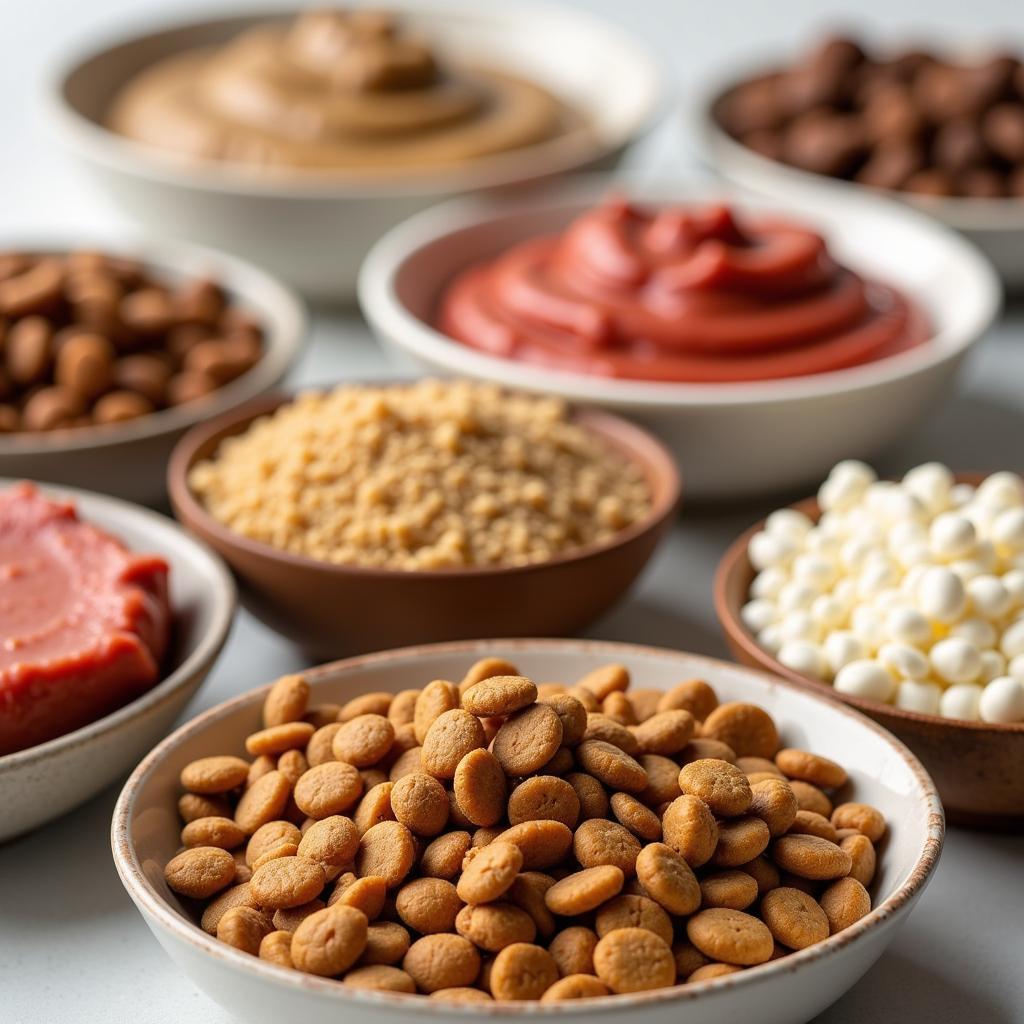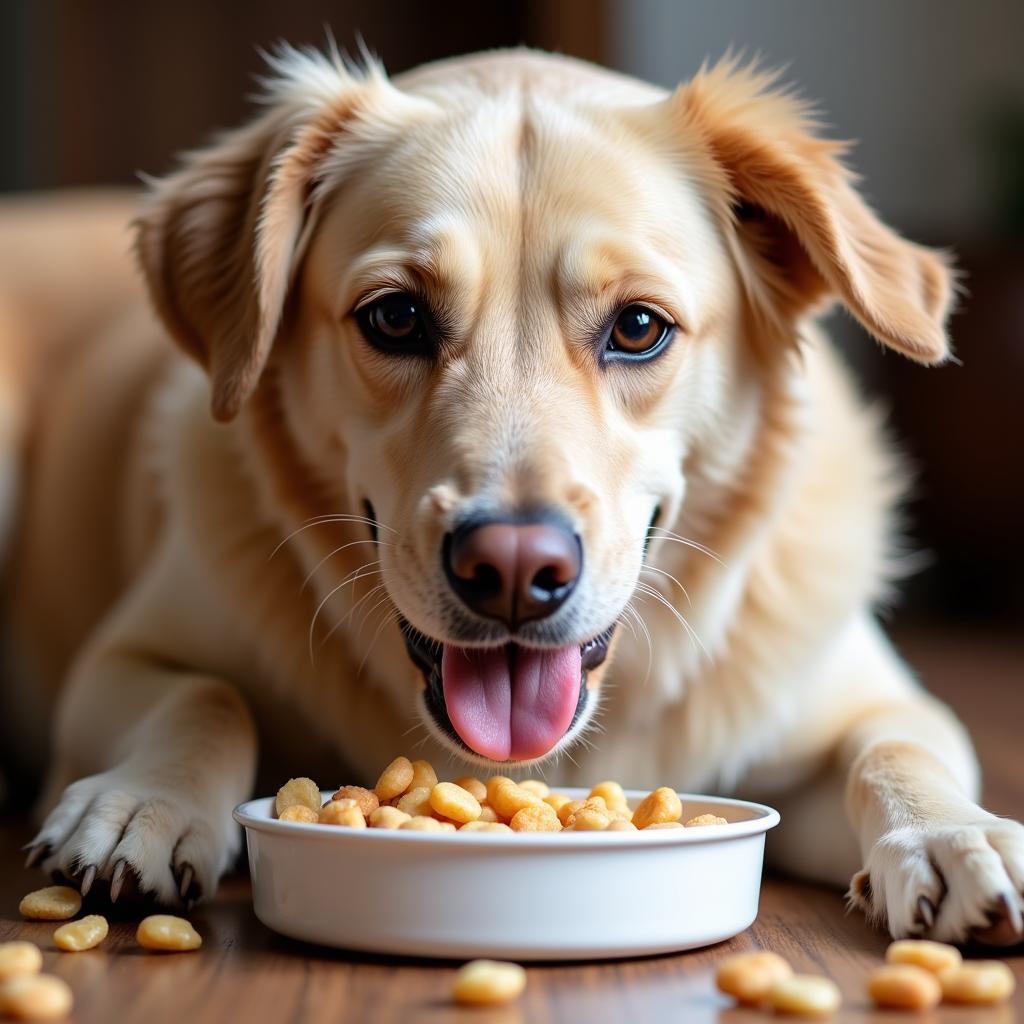Choosing the right soft dog food is crucial for dogs without teeth. Their dietary needs change, and providing easily digestible, palatable food becomes paramount. Finding the best soft dog food for your toothless companion involves considering factors like ingredients, texture, and nutritional value. This guide will help you navigate the options and ensure your dog receives the nourishment they need.
Why Soft Dog Food is Essential for Dogs with No Teeth
Dogs missing teeth face challenges when it comes to eating regular kibble. Hard food can be painful and even impossible for them to chew, leading to inadequate nutrition and potential health problems. Soft food offers a comfortable and convenient alternative, allowing these dogs to enjoy their meals and receive all the necessary nutrients. Switching to soft food can significantly improve their quality of life and overall health. It also encourages proper digestion since they don’t have to struggle with chewing. A diet of soft food can help your dog maintain a healthy weight, especially if they are senior dogs. For puppies who have yet to develop all their teeth, soft food is also a great option.
Choosing the best food for dogs with no teeth requires careful consideration.
Key Considerations When Choosing Soft Dog Food
There are several factors to consider when selecting the perfect soft dog food for your toothless canine. Look for foods that are highly digestible and packed with essential nutrients. Check the ingredient list for high-quality protein sources, healthy fats, and digestible carbohydrates. Avoid foods with artificial colors, flavors, and preservatives. Consider your dog’s age, breed, and any underlying health conditions. Consulting with a veterinarian can provide personalized recommendations tailored to your dog’s specific needs.
Ingredient Quality and Nutritional Value
Just because a food is soft doesn’t mean it’s nutritionally complete. Prioritize foods made with whole ingredients, like real meat and vegetables, and avoid fillers and by-products. Look for foods that are AAFCO-approved to ensure they meet the minimum nutritional requirements for dogs.
Texture and Palatability
Texture is key for dogs without teeth. Opt for foods that are truly soft, such as pate, mousse, or finely ground options. Consider your dog’s preferences and try different textures to find what they enjoy most. A food that’s easy to lap up will ensure they consume enough calories and stay hydrated.
Special Dietary Needs
If your dog has allergies or other health concerns, choose a soft food formulated to address those specific needs. For example, there are soft foods for sensitive stomachs, weight management, and joint health.
 Soft Dog Food Options for Toothless Canines
Soft Dog Food Options for Toothless Canines
Types of Soft Dog Food for Dogs with No Teeth
Several types of soft dog food are suitable for dogs without teeth. Canned food, typically pate or chunks in gravy, is a popular choice due to its high moisture content and palatability. Pouches offer similar benefits to canned food but are often more convenient for single servings. Freshly prepared soft food diets are also gaining popularity, providing a highly nutritious and customizable option.
Using a dog food processor can help adjust the texture of regular dog food to make it suitable for dogs with no teeth.
Making the Transition to Soft Food
Transitioning your dog to a new food should be done gradually to avoid digestive upset. Start by mixing a small amount of the new soft food with their current food and gradually increase the proportion of soft food over several days. Monitor your dog for any signs of digestive issues, such as vomiting or diarrhea, and consult your veterinarian if any concerns arise.
Monitoring Your Dog’s Health
After switching to soft food, keep a close eye on your dog’s weight, coat condition, and energy levels. Regular checkups with your veterinarian will help ensure they are thriving on their new diet. If you notice any changes in their health or eating habits, consult your veterinarian promptly.
 A Toothless Dog Enjoying a Meal of Soft Food
A Toothless Dog Enjoying a Meal of Soft Food
Frequently Asked Questions (FAQ)
-
What is the best soft food for senior dogs with no teeth? Dog food for older dogs with bad teeth often prioritizes digestibility and added nutrients.
-
Can I make my own soft dog food? Yes, homemade soft dog food can be a healthy option, but it’s essential to ensure it’s nutritionally balanced. Consulting a veterinary nutritionist can help create a suitable recipe.
-
Is wet food better than dry food for dogs without teeth? For toothless dogs, wet food is generally easier to consume and digest.
-
How can I encourage my dog to eat soft food? Try warming the food slightly or adding a small amount of low-sodium broth to enhance the aroma and flavor.
-
Are there any specific brands of soft food recommended for dogs with no teeth? Many brands offer high-quality soft food options. Your veterinarian can help you choose a brand that meets your dog’s specific needs.
-
My dog seems to be losing weight on soft food. What should I do? Consult your veterinarian to ensure the food provides sufficient calories and to rule out any underlying health issues.
-
How often should I feed my toothless dog soft food? Follow the feeding guidelines on the food packaging or consult your veterinarian for personalized recommendations.
 Senior Dog Getting a Checkup
Senior Dog Getting a Checkup
Common Scenarios and Questions
Scenario: My senior dog recently lost a few teeth and is now struggling to eat his kibble.
Question: What are the best soft food options for him?
Answer: Look for highly digestible, palatable soft foods designed for senior dogs, possibly with added joint support.
Scenario: My puppy hasn’t developed all his teeth yet and is having trouble chewing hard food.
Question: Can I feed him soft food?
Answer: Yes, soft food is appropriate for puppies and can be offered alongside or instead of kibble until their adult teeth come in. Consider Earthborn Holistic puppy food for a high-quality option.
Scenario: My dog has allergies and is missing teeth.
Question: How can I find a soft food that won’t trigger his allergies?
Answer: Choose a hypoallergenic soft food formulated for sensitive stomachs and free from common allergens.
Further Resources
For more information on dog food for no teeth, explore our other articles and resources on our website.
Conclusion
Selecting the right Soft Dog Food For Dogs With No Teeth is an essential part of ensuring their health and well-being. By considering factors such as ingredient quality, texture, and nutritional value, you can help your toothless companion thrive. Remember to consult with your veterinarian for personalized guidance. With a little research and attention to your dog’s individual needs, you can find the perfect soft dog food to keep them happy, healthy, and well-nourished.
Need help? Contact us! Phone: 02437655121, Email: [email protected] or visit us at 3PGH+8R9, ĐT70A, thôn Trung, Bắc Từ Liêm, Hà Nội, Việt Nam. We have a 24/7 customer support team.